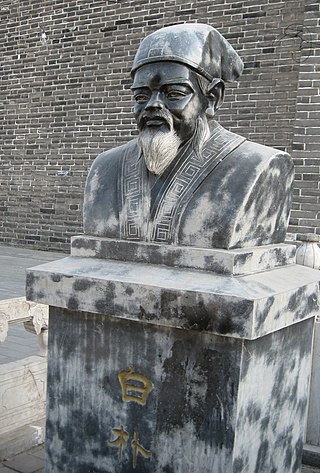
Chinese poetry is poetry written, spoken, or chanted in the Chinese language, and a part of the Chinese literature. While this last term comprises Classical Chinese, Standard Chinese, Mandarin Chinese, Yue Chinese, and other historical and vernacular forms of the language, its poetry generally falls into one of two primary types, Classical Chinese poetry and Modern Chinese poetry.

Classical Chinese poetry is traditional Chinese poetry written in Classical Chinese and typified by certain traditional forms, or modes; traditional genres; and connections with particular historical periods, such as the poetry of the Tang dynasty. The existence of classical Chinese poetry is documented at least as early as the publication of the Classic of Poetry (Shijing). Various combinations of forms and genres have developed over the ages. Many or most of these poetic forms were developed by the end of the Tang dynasty, in 907 CE.

Guan Hanqing ; sobriquet Yǐzhāi (已齋), Yīzhāi (一齋), Yǐzhāisǒu (已齋叟); was a Chinese dramatist, playwright, and poet during the Yuan Dynasty. He has been described as among the most prolific and highly regarded dramatists of the Yuan period.

Xu Wei, also known as Qingteng Shanren, was a Chinese painter, playwright, poet, and tea master during the Ming dynasty.

Ma Zhiyuan, courtesy name Dongli, Chinese dramatist, playwright, and poet during the Yuan dynasty.
Wang Shifu (1250-1337?), courtesy name of Wang Dexin, was a Chinese dramatist and playwright of the Yuan dynasty. He is a representative of “Wencaipai” in Chinese opera literature. He was born in Dadu, the capital of the Yuan dynasty. His ancestral home was in Hebei province, Baoding city. Wang was born into a noble family. His father was a general who worked for Genghis Khan. Under the impact of his elder generation, Wang started his officialdom career as a county official. He was then promoted to the investigating censor of Shanxi Province due to his brilliant talent and achievement. However, due to his characters and dispositions, he finally chose to escape from the officialdom and devoted himself to literature creation.

Bai Renfu, also known as Bai Pu, was a renowned Chinese playwright of the Yuan dynasty.

Theatre of China has a long and complex history. Traditional Chinese theatre, generally in the form of Chinese opera, is musical in nature. Chinese theatre can trace its origin back a few millennia to ancient China, but the Chinese opera started to develop in the 12th century. Western forms like the spoken drama, western-style opera, and ballet did not arrive in China until the 20th century.
Zhongyuan Yinyun, literally meaning "Rhymes of the central plain", is a rime book from the Yuan dynasty compiled by Zhou Deqing (周德清) in 1324. An important work for the study of historical Chinese phonology, it testifies many phonological changes from Middle Chinese to Old Mandarin, such as the reduction and disappearance of final stop consonants and the reorganization of the Middle Chinese tones. Though often termed a "rime dictionary", the work does not provide meanings for its entries.
The Qu form of poetry is a type of Classical Chinese poetry form, consisting of words written in one of a number of certain, set tone patterns, based upon the tunes of various songs. Thus Qu poems are lyrics with lines of varying longer and shorter lengths, set according to the certain and specific, fixed patterns of rhyme and tone of conventional musical pieces upon which they are based and after which these matched variations in lyrics generally take their name. The fixed-tone type of verse such as the Qu and the ci together with the shi and fu forms of poetry comprise the three main forms of Classical Chinese poetry.
Sanqu is a fixed-rhythm form of Classical Chinese poetry or "literary song". Specifically sanqu is a subtype of the qu formal type of poetry. Sanqu was a notable Chinese poetic form, possibly beginning in the Jin dynasty (1115–1234), but especially associated with the Yuan (1271–1368), Ming (1368–1644) and Qing (1644–1912) dynasties. The tonal patterns modeled on tunes drawn from folk songs or other music.
Lu Zhi was Chinese writer of the Yuan dynasty. His courtesy name was Chudao (处道) and his pen name was Shuzhai (疏斋). He was born in modern Zhuozhou, Hebei, although some accounts claim he was from modern Yongjia, Zhejiang.
Shang Ting 商挺 (1209–1288), also known as Shang Mengqing 商孟卿 and in old age as “The Old Man of Zuo Mountain” 左 山老人. was a Yuan 元 period writer of Chinese Sanqu poetry. He was also a noted calligrapher and landscape artist. Unfortunately, although a prolific poet, most of his writings have been lost. The surviving sanqu poems of the poet are all written to the same musical mode and song title. However, the content of the poems suggests they were written at different times. His son Shang Qi 商琦 was likewise an official and artist.
Wang Yun, was a writer of Chinese sanqu poetry from Weizhou. He was born during the Jin dynasty, but became an official under the Yuan dynasty. Initially a local official, he was given a series of appointments in Central Region, Henan Jiangbei and Jiangzhe provinces starting in 1268. Later he was summoned to the capital where he served in the Hanlin Academy. At twenty, he became the acquaintance of the renowned writer Yuan Haowen. He was a noted prose stylist in the Tang manner of unadorned directness. His poetry often depicted the downtrodden and the poor. His collected works in one-hundred fascicles is extant. A biography of Wang exists in the official history of the Yuan dynasty (元史). Forty-one of his sanqu are extant.
Yuan poetry refers to those types or styles of poetry particularly associated with the era of the Yuan dynasty (1271–1368), in China. Although the poetic forms of past literature were continued, the Yuan period is particularly known for the development of the poetic aspects included in the complex mix of different art forms which characterize Chinese opera, namely the qu or fixed-tone pattern type of verses that were delivered by the actors of these shows. Although the language of Yuan poetry is still generally considered to be Classical Chinese, a certain vernacular aspect reflecting linguistic changes can be seen in some of the fixed-rhythm verse forms, such as Yuan ci and qu. Certain aspects of Yuan poetry can be understood in the context of the social and political changes which took place as part of the process of the Mongol conquest of the Jin and Song Dynasties and their subsequent establishment of the Yuan dynasty.

Zaju was a form of Chinese opera which provided entertainment through a synthesis of recitations of prose and poetry, dance, singing, and mime, with a certain emphasis on comedy. Although with diverse and earlier roots, zaju has particularly been associated with the time of the Yuan dynasty (1271–1368), and zaju remains important in terms of the historical study of the theater arts as well as Classical Chinese literature and poetry. Zaju is known to have been performed during the earlier Song (960–1279) and Jin (1115–1234) dynasties. The various particulars of the zaju multimedia performance were derived from many and diverse sources of musical, dance, poetry, and theater traditions.

Lì is the pinyin romanization of the Chinese surname written 酈 in traditional character and 郦 in simplified character. It is also spelled Lik according to the Cantonese pronunciation. It is listed 303rd in the Song dynasty classic Hundred Family Surnames.
Tian Yuan Tan is a Singaporean scholar of Chinese literature. Since 2019, he has served as Shaw Professor of Chinese at the University of Oxford and a Professorial Fellow of University College. Prior to his appointment at Oxford, he was Professor of Chinese Studies at SOAS, University of London.
Liu Shuahe was a popular Chinese yuanben actor of the late Jin dynasty (1115–1234) who was active in the first half of the 13th century. He was a group leader of the Court Entertainment Bureau, and some yuanben and zaju plays were written about him.
Hou Shuaqiao, also known as Qian Shuaqiao or possibly Qian Shuaxiao (欠耍削), was a Chinese acrobat and actor who played fujing roles in zaju performances. He was based in Khanbaliq (Dadu), the winter capital of the Yuan dynasty. He was best-known for his somersaults, a required skill for playing martial roles in traditional Chinese operas. His somersaults were the highest of all performers.
1. Nienhauser, William H. (ed.), The Indiana Companion to Chinese Literature, Indiana University Press, 1986, p. 246.
2. Mair, Victor H., The Columbia History of Chinese Literature, Columbia University Press, 2001, pp. 126, 145, 809.








